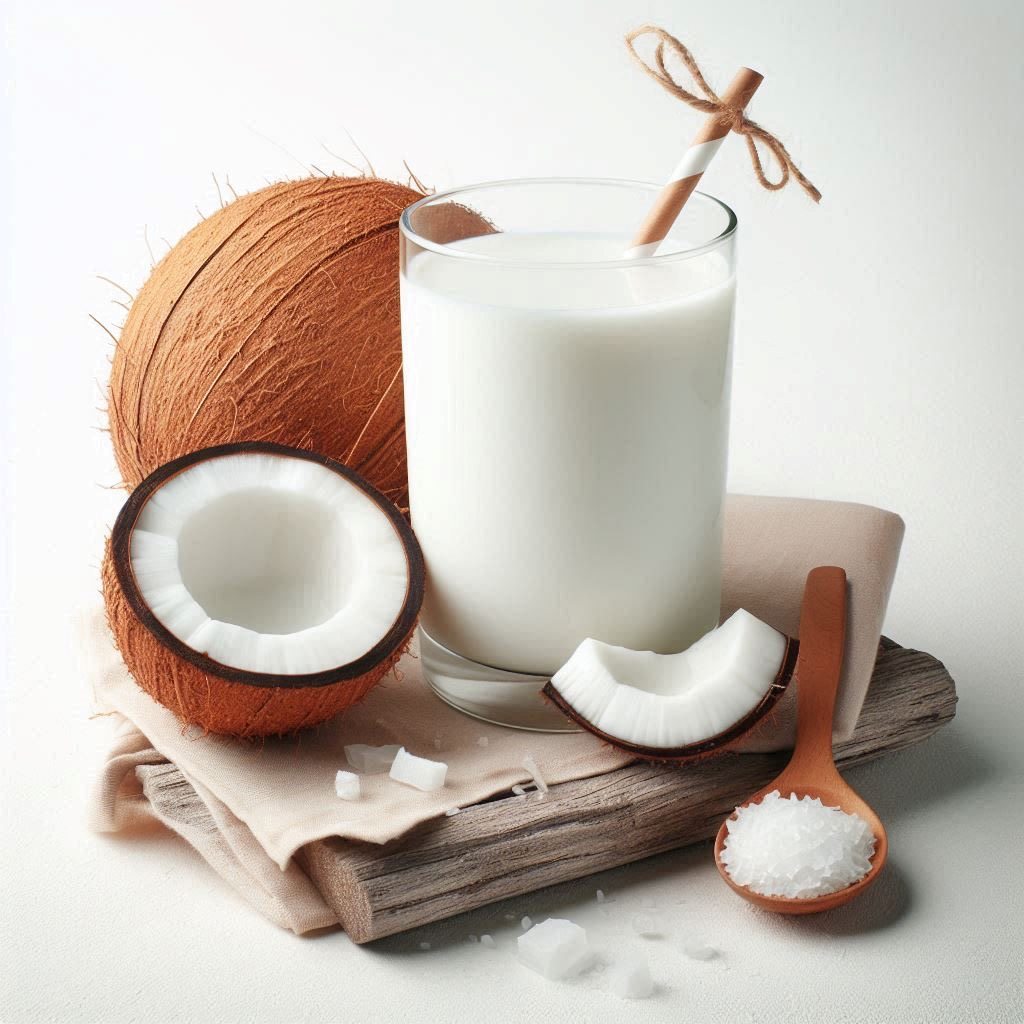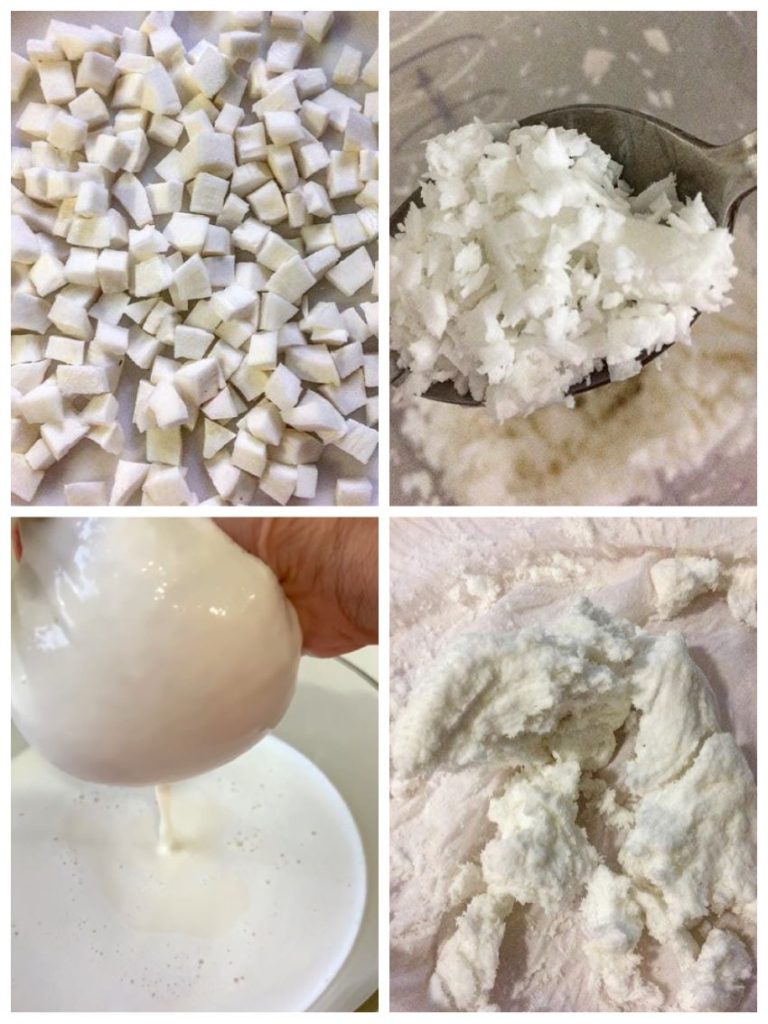
Coconut is also known as Kalpa Vriksha in Sanskrit, which means Tree of Life– “the tree which provides all the necessities of life”. All its parts from top to bottom are used to sustain human life.
In this post I will share with you how to make coconut milk in the most easiest way. Coconut milk is a traditional food ingredient used in Southeast Asia, Oceania, South Asia, and East Africa. It is so easy to make at home. I actually never buy coconut milk from the market because it takes 5 minutes to make it at home. Also, store-bought Coconut milk contains additives and gums in the canned version that I prefer to avoid. They don’t contain much of actual coconut and remember they are likely to contain some kind of preservatives, flavouring and sweeteners because homemade version will spoil in a few days and store bought ones can last you months. Also, curries and stews made from homemade coconut milk tastes so much better and real than store bought ones.
This plant milk is tasty alternative to cow’s milk that provides several health benefits too. Coconut milk comes from white flesh of mature brown coconuts, which are the fruit of the coconut tree. Unlike coconut water, the milk does not occur naturally. Instead, solid coconut flesh is mixed with water to make coconut milk, which is about 50% water.
The milk has a sweet taste, is thick in consistency and has a rich, creamy texture. But it goes beyond taste – Ayurvedic experts ages ago discovered that coconut milk is a power drink; and modern research confirms this. It pacifies Vata and Pita while increasing Kapha. If you find yourself unable to digest dairy or are allergic to nuts, this milk is a pretty good option for you. You can also try oats milk if you are allergic to dairy or nut milk. Check out this easy to make recipe of Oats Milk here. In case you are not allergic to nut milk, you can try this delicious Almond Milk recipe.

Benefits of Coconut Milk
This white elixir is full of surprising benefits. People are so obsessed with cow’s milk, goat’s milk, camel’s milk that this ancient milk is conveniently cornered.
- Lauric acid
Coconut milk contains an important ingredient: lauric acid. It is considered anti-inflammatory, antiviral and antibacterial. It helps your body fight off pathogens. Therefore, have coconut milk if you are suffering from bacterial or viral disease.
- Cytokines as an Anti-Aging Agent
Coconut milk contains strong antioxidant protection. Cytokines are proteins that protect our cells, and can protect the skin from premature aging.
- Improves digestion
Coconut helps to improve digestion due to the presence of medium-chain fatty acids. These medium-chain fatty acids are digested and absorbed easily in the body. They may be immediately broken down by saliva and gastric juice. Therefore, consuming coconut milk may be good for people with digestive problems.
- Coconut milk for Cancer
Coconut milk may be beneficial for cancer. Various studies on cell lines have shown that coconut milk may help in the case of breast cancer. Coconut milk may kill the cancer cells and suppress the growth of cancer-causing cells.
- Reducing Cholesterol Levels
This milk can help maintain your cardiovascular health due to its high content of lauric acid. Some studies indicate that consuming foods with coconut milk in moderation could help to lower the levels of bad cholesterol low and boost the levels of good cholesterol
- May fasten recovery from sickness
Though not as good a source of electrolytes as coconut water, coconut milk does contain magnesium and potassium. These minerals regulate blood volume, aid in the functioning of the heart and help with diarrhea and dehydration.
How to make Coconut Milk at Home
Recipe: makes around 600 ml
Ingredients:
- 1 mature Coconut (remove the brown skin)
- Water: 3 cups; half warm and half room temperature water
Instructions
- Chop the coconut into tiny pieces.
- Put the coconut pieces in a blender and shred it.
- Then add hot water first and blend on high for a few seconds. Then add room temperature water and blend again.
- Open the lid and scrap the sides and blend again for a minute.
- Take a clean large bowl and spread a muslin or cheese cloth over it. Sieve through the prepared milk through it. Squeeze out all the milk using your hand from the coconut meat. And that’s it! Coconut milk is ready to be served.

Notes:
- Though Coconut milk is least allergic but please consult your pediatrician before introducing it to kids below 1 years. Introduce little at a time.
- Since coconut milk is high in fats, don’t feed more than 150 ml to toddlers. Though the homemade version can be made less creamy by diluting it with more water.
- Coconut milk is not a great source of Calcium, Protein or Vitamin D. If you are replacing dairy with coconut milk, then eat a well balanced diet to get all the nutrients.
- Coconut milk has innumerable benefits but keep in mind that coconut milk is relatively rich in calories. So, you should only have it in moderate amounts.
- You can re-use the residue of coconut as fertilizer for your plants or you can dry roast it and store in an air-tight jar. Use it to make cookies, cakes,muffins,energy bars etc.
- You can store this milk in glass bottles for upto 4-5 days in the refrigerator.
I hope you liked this recipe and will try out this easy to make Homemade Coconut Milk. If you do, do let me know in the comment section. Would love to hear from you guys. Till then cheers to good health! 🙂











